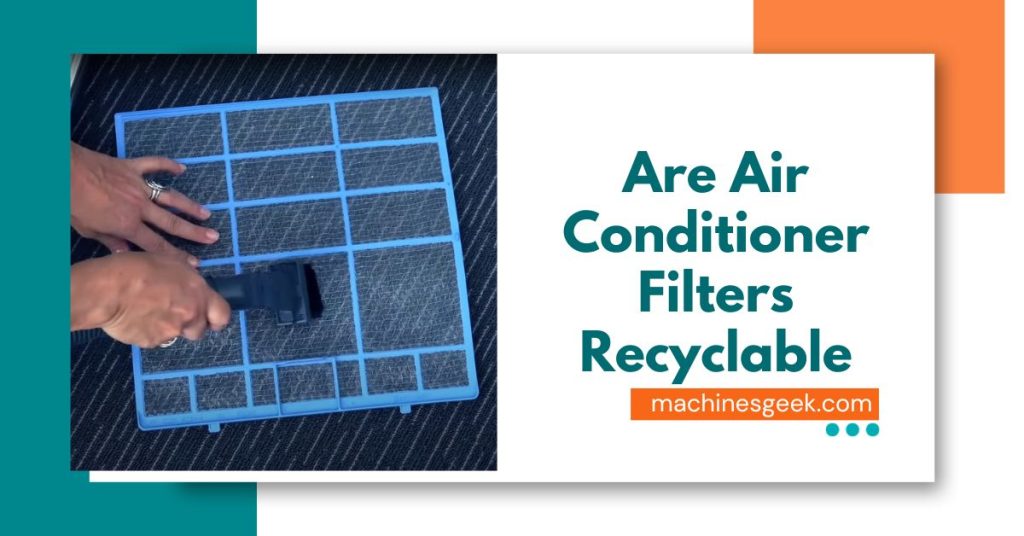Yes, air conditioner filters are recyclable, but they cannot be simply tossed into the recycling bin. Most cities do not accept air filters for recycling, so they need to be placed in the garbage instead.
This includes the entire filter, including the cardboard frame, even though the cardboard could theoretically be recycled. However, some organizations may accept non-recyclable filter materials for repurposing. It’s important to separate any non-recyclable materials, such as fiberglass or polyester, from the recyclable parts of the filter.
Properly disposing of old air filters is essential for maintaining air quality and preventing dust and debris from re-entering the air.
Air Conditioner Filters
the air conditioner filter is often made of cardboard, which can be recycled. However, the filter medium itself, which is usually made of materials like fiberglass or polyester, is not recyclable in most cases. This means that if you want to recycle your air conditioner filter, you will need to separate the filter medium from the frame.
There are organizations that accept non-recyclable filter material for repurposing, so you can send the filter medium to them instead of throwing it in the trash. Additionally, some cities may have specific recycling programs for air conditioner filters, so it’s worth checking with your local waste management department to see if they accept them.
In conclusion, while air conditioner filters are not generally recyclable, there are still options available for disposing of them responsibly. Remember to remove any non-recyclable materials from the filter before recycling the frame, and check with your local recycling programs for specific guidelines.
Recycling Air Conditioner Filters
Air conditioner filters are not usually recyclable due to the materials they are made of. Most filters contain non-recyclable materials such as fiberglass or polyester, which cannot be processed at a recycling plant.
This means that air filters cannot be placed in the recycling bin and should instead be disposed of in the regular garbage. It is important to properly dispose of air filters to prevent any potential environmental impacts.
When replacing an air filter, it is recommended to immediately bring the old filter out to the trash can and throw it away there. This ensures that no dust or debris from the filter is released back into the air.
By following these proper disposal methods, you can effectively manage your air conditioner filters and contribute to environmental sustainability.
Alternative Solutions For Used Air Conditioner Filters
One alternative solution for used air conditioner filters is repurposing or reusing them in creative ways. Instead of throwing them away, you can give them a new purpose.
Some ideas for repurposing or reusing old air filters include using them as insulation material for soundproofing, making craft projects such as wall art or lampshades, or using them as a protective cover for delicate items during transportation.
Another option is to look for donation or recycling programs specifically designed for certain types of air filters. These programs ensure that the filters are properly disposed of or recycled, reducing environmental impact.
Alternatively, you can explore creative DIY projects using air filters, such as making air filter masks or using them for gardening purposes like filtering water for plants. By finding alternative solutions, we can minimize waste and contribute to a more sustainable lifestyle.
Increasing Sustainability In Air Conditioning Systems
Increasing sustainability in air conditioning systems is crucial for reducing environmental impact. One way to achieve this is by using energy-efficient alternatives to traditional air conditioning systems. These alternatives, such as solar-powered or geothermal systems, consume less energy and produce fewer greenhouse gas emissions.
Another aspect of sustainability is using eco-friendly air filters. These filters are made from recyclable materials and are designed to remove harmful particles from the air without releasing any pollutants. In addition to improving indoor air quality, eco-friendly filters reduce waste and promote a circular economy.
Regular maintenance is also important for extending the life of air filters. By cleaning or replacing filters regularly, they can continue to function effectively and prevent the build-up of dust and allergens in the air conditioning system. This not only improves system efficiency but also reduces the need for frequent filter replacements.
Are Air Conditioner Filters Affected by Storing the Unit Outside in the Winter?
Yes, storing air conditioners outside in winter can affect the filters. The cold temperatures and moisture can cause the filters to become damaged or clogged, reducing the unit’s efficiency. It’s important to properly store the unit to prevent any damage to the components, including the filters.
Frequently Asked Questions
What Can I Do With An Old Air Filter?
Dispose of old air filters in an outside trash can. Bring the new filter in place, then throw the old one away. Most cities don’t accept air filters for recycling. Cardboard frames should also be disposed of in the garbage.
Some organizations accept non-recyclable filter material for repurposing.
How Are Air Filters Recycled?
Air filters are not usually recyclable and should be placed in the garbage. Even the cardboard frame cannot be recycled. However, some organizations accept non-recyclable filter material for repurposing. Always check with the manufacturer or local recycling facilities for specific guidelines.
Can Air Vent Filters Be Recycled?
No, air vent filters cannot be recycled. They have to be thrown away in the garbage.
Conclusion
Air conditioner filters may not be recyclable in most cases and will likely need to be disposed of in the trash. While some filters may contain recyclable materials like cardboard, it is generally recommended to throw the entire filter away.
However, it’s always a good idea to check with the manufacturer or your local recycling facility to see if they have any specific guidelines for recycling air filters. Proper disposal of old filters is important to maintain air quality and efficiency in your home.








